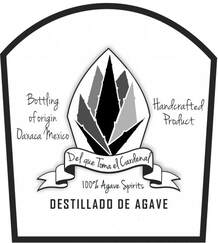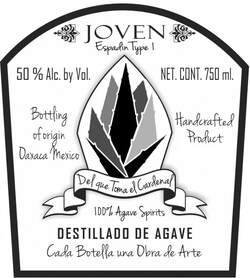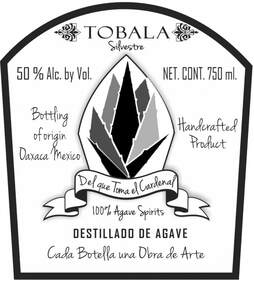Del Que Toma el Cardenal was born in 2014 in response to the industrialization of mezcal. With mezcal’s rise in popularity, more and more of this spirit is being produced using less-traditional methods. Major brands are buying up the agave farms that had serviced the small producers, putting the future of independent Mexican spirits producers at risk.
A small group of these producers, in partnership with entrepreneurs from the city of Oaxaca de Juárez, founded Del Que Toma el Cardenal in an effort to preserve the ancestral legacy of their families and to safeguard the multi-generational wisdom that has fueled international interest in agave spirits. The producers who participate in Del Que Toma el Cardenal are from the municipality of Santo Domingo Albarradas, a Zapotec community located Oaxaca's Valles Centrales region, in the Tlacolula district. They follow a set of rules that is more rigorous than the criteria established to certify mezcal.
The Fundamentals of Del Que Toma el Cardenal are as follows:
Much like wine, these heirloom spirits reflect the place they were made (terroir), the agave they were made from (many are allowed), the source of water they were made with, and the 400 decisions that the producer made in the process. The agaves are grown in the basin of the Rio Grande, surrounded by high mountains where the temperate climate provides ideal conditions for long-growth, sugar-rich agaves. The abundance of mineral-rich water from the Santo Domingo, Santa Catarina, and La Calavera rivers plays a pivotal role in the flavor and aromas of the agaves.
The result? Spirits that reflect their terroir as clearly as they represent the culture from which they come. We are proud to welcome this cooperative agave-spirits project to our portfolio.
A small group of these producers, in partnership with entrepreneurs from the city of Oaxaca de Juárez, founded Del Que Toma el Cardenal in an effort to preserve the ancestral legacy of their families and to safeguard the multi-generational wisdom that has fueled international interest in agave spirits. The producers who participate in Del Que Toma el Cardenal are from the municipality of Santo Domingo Albarradas, a Zapotec community located Oaxaca's Valles Centrales region, in the Tlacolula district. They follow a set of rules that is more rigorous than the criteria established to certify mezcal.
The Fundamentals of Del Que Toma el Cardenal are as follows:
- The cultivation of agaves is done by the same producers of Santo Domingo Albarradas and when more agave is required, it is paid at a value equal to or greater than the market to the agaveros of the region
- Only mature agave are used for production.
- The Piñas are cooked in wood ovens with stones from the nearby rivers in holes dug in the ground.
- The piñas are ground in a tahona pulled by a mule with a stone wheel.
- It is fermented in oak tubs and no chemicals are added to the process, the fermentation takes place naturally, so it takes from twenty to thirty days in its fermentation
- The distillation is carried out in a copper pot still, two distillations are carried out both for espadín and for the tobalá
- The distilled agave spirit cannot be cut with water, but it may be adjusted using the puntas and colas (heads and tails) from the same distillation
- As a rule we have to charge a fair price to our customers, we are below the price of other products even though our distillate is of higher quality than the vast majority of other brands
Much like wine, these heirloom spirits reflect the place they were made (terroir), the agave they were made from (many are allowed), the source of water they were made with, and the 400 decisions that the producer made in the process. The agaves are grown in the basin of the Rio Grande, surrounded by high mountains where the temperate climate provides ideal conditions for long-growth, sugar-rich agaves. The abundance of mineral-rich water from the Santo Domingo, Santa Catarina, and La Calavera rivers plays a pivotal role in the flavor and aromas of the agaves.
The result? Spirits that reflect their terroir as clearly as they represent the culture from which they come. We are proud to welcome this cooperative agave-spirits project to our portfolio.
Joven Espadin type 1100% Espadin (angustifolia haw); natural fermentation without chemical components in an oak wood tub, and roasted in the traditional ground oven lined with hot stones. Distilled twice in a copper still. 50% Alc. by Vol.
Place of origin: Santo Domingo Albarradas, Oaxaca. Mezcalero : Don Fortunato Santiago Pérez. TOBALA Silvestre100% Tobalá (wild Patatorum); natural fermentation without chemical components in an oak wood tub, and roasted in the traditional ground oven lined with hot stones. Distilled twice in a copper still.
50% Alc. Vol. Place of origin: Santo Domingo Albarradas, Oaxaca. Mezcalero : Don Fortunato Santiago Pérez. |


